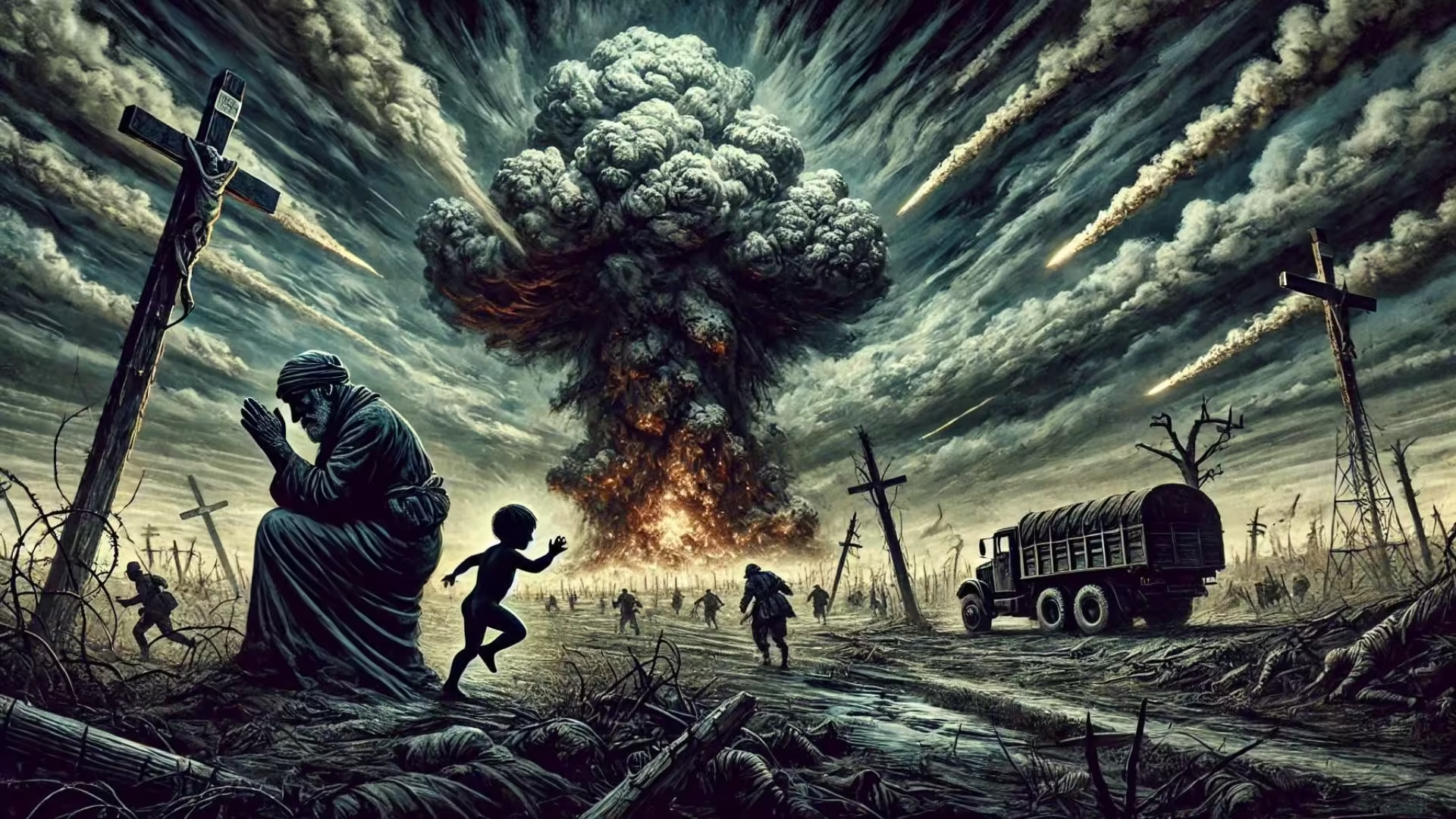Poetry often serves as a profound reflection of the human condition, capturing the complexities of emotions and experiences in a few potent lines. The poem “Bombardment” delves into the harrowing realities of war, exposing the brutal consequences and moral dilemmas faced by those involved. This article offers an in-depth analysis of “Bombardment,” exploring its themes, imagery, and the emotional impact it leaves on readers.
Bombardment | by Phoenix
drop another bomb
a child’s running scared
but children are no children in this part of town
they cut their cords and walk from day one
young lads at two
decoys at four
armed and ready at ten
drop the bomb
show no quarter
we left them nothing at all
let us take their lives.
Drop another bomb
an old man passing
acts like to a prayer going
arrange the meeting yourself
he’s longed for long to meet his maker
send him there if there is one
the new world is for the young
a revolution must bathe in blood
no place for an old bough
supported by young sprouts
taking all their fruits
let it fall and feed the ones below
soaked in a pool of their own
drop the bomb and move away
a clear conscience in there you may
find if I only knew what conscience was
drop the bomb
end his suffering
he has lived for too long.
Drop another bomb
too slow she’s moving
carrying a heavy load
in a time of war
who needs another mouth
to feed, who needs another species
to breed and get through a night
so dark for years waiting for light
with the char of our might
we will drop another bomb
make sure day never comes along
she shouldn’t want that child
she doesn’t need that child
she cannot feed that child
as long as like locusts we fill the sky
no green left but we keep our quest alive
for one last patch we may devour
then call its taste so sour
how could it be any different?
it’s still our land
drop the bomb and remember
you and I will never forgive
ourselves, so drop the bomb
that’s an order.
“Bombardment” is a poignant and stark depiction of the horrors of war. Through vivid imagery and compelling narrative, the poem portrays the indiscriminate violence and the dehumanization that war brings. The repeated command to “drop another bomb” underscores the relentless and unforgiving nature of warfare, while the detailed descriptions of the victims highlight the tragic loss of innocence and humanity.
Themes in “Bombardment”
1. The Brutality of War
The poem vividly describes the brutal realities of war, painting a picture of a world where violence is routine and life is cheap. The repeated phrase “drop another bomb” acts as a chilling mantra, emphasizing the mechanical and unfeeling nature of wartime actions. The imagery of children forced to grow up too soon, the elderly longing for death, and the pregnant woman unable to care for her child underscores the pervasive and indiscriminate cruelty of war.
2. Loss of Innocence
A recurring theme in the poem is the loss of innocence, especially among children. The lines “children are no children in this part of town / they cut their cords and walk from day one” illustrate how war robs children of their childhood, thrusting them into a harsh reality where they must fend for themselves from an early age. This loss of innocence is a powerful condemnation of the impact of conflict on the most vulnerable members of society.
3. Moral Ambiguity and Dehumanization
The poem also explores the moral ambiguity and dehumanization inherent in war. The soldiers are depicted as following orders without regard for the humanity of their targets. Phrases like “a clear conscience in there you may / find if I only knew what conscience was” suggest a deep internal conflict and a loss of moral compass. This theme is further highlighted by the cold, detached tone of the commands to kill, reflecting how war can strip individuals of empathy and compassion.
Imagery and Symbolism
1. The Fog of War
The “fog of war” mentioned at the beginning symbolizes confusion, chaos, and the obscuring of moral clarity. In this fog, decisions are made that might be unthinkable in peacetime, and the true cost of actions is often hidden until it’s too late.
2. The Old Man and the Pregnant Woman
The old man and the pregnant woman serve as symbols of the past and the future, respectively. The old man’s longing to meet his maker and the callous suggestion to “send him there if there is one” reflect a disregard for the wisdom and experiences of the past. The pregnant woman, carrying the hope of new life, is burdened by a world that offers no future for her child. This dichotomy highlights the way war destroys both history and potential.
Emotional Impact
“Bombardment” is a deeply emotional and thought-provoking poem. Its unflinching portrayal of the horrors of war forces readers to confront the stark realities that are often glossed over in more sanitized accounts of conflict. The repeated commands to “drop another bomb” create a sense of relentless pressure and inevitability, mirroring the inescapable nature of wartime violence. The detailed descriptions of the victims elicit empathy and sorrow, making the reader acutely aware of the human cost of war.
“Bombardment” is a powerful and haunting poem that offers a raw and unfiltered look at the impact of war. Through its vivid imagery, compelling themes, and emotional depth, it forces readers to grapple with the moral complexities and human consequences of conflict. This poem is a stark reminder of the need for compassion, empathy, and a deep understanding of the true cost of war.
Poetry like “Bombardment” plays a crucial role in helping us understand and reflect on the darkest aspects of human nature and history. By engaging with such works, we not only honor the experiences of those affected by war but also foster a greater awareness of the need for peace and humanity in our world.











0 Comments